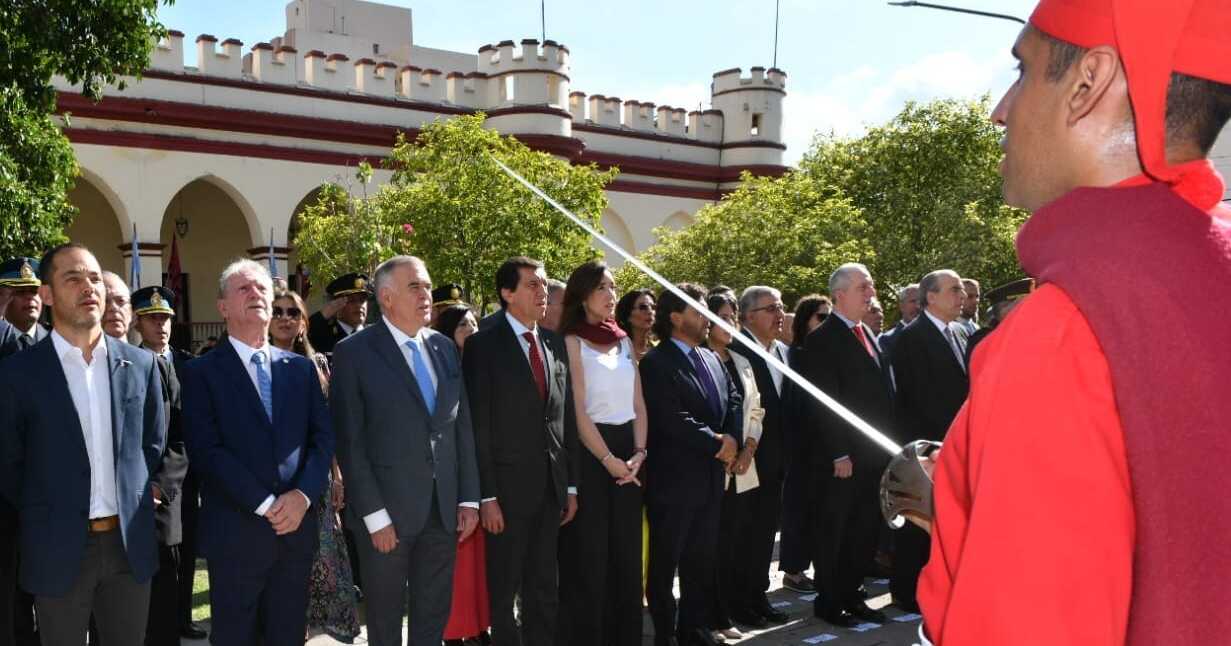
“Give Jaldo, you can do it,” someone tweets on Friday night. For those hours The confrontation between Javier Milei and the governor of Chubut, Ignacio Torres, had escalated. by the national decision to cut $3 billion from the federal co-participation per day (due to a debt from the Provincial Development Trust Fund) and the governor’s threat not to deliver oil to the nation. In this new crisis front, Torres received the support of all the governors, without distinction of political signs, except for one: Osvaldo Jaldo.
Argentina: 23 provinces against the Nation
Osvaldo Jaldo: pic.twitter.com/kXHf5W0TTk— Superlogic (@jpgasok) February 24, 2024
To end the week, the Tucumán governor traveled to Salta in search of reasons to renew his chainsaw creed. There he met the vice president, Victoria Villarrueland the Minister of the Interior, Guillermo Francos, along with other governors of the NOA and NEA. The celebrations for a new anniversary of the Battle of Salta were presented as the first attempt to rebuild the dialogue with the provincial leaders after the defeat of the Omnibus Law. Hours before, from Corrientes, Milei himself discursively undermined those bridges by stating that Congress “is a nest of rats” and that “politicians are shit that people despise.” Even so, Jaldo returned confident because of the dialogue and the diffuse promises that he chooses to believe.
The few details about the conclave in Salta do not eliminate a tacit agreement where Jaldo is the spearhead of one of the parties. A part of this agreement was made explicit Luis Caputo in an interview this week. The Minister of Economy, with the ease that the LN+ scribes give him, stated that The government does not completely rule out the Omnibus Law and that many governors would reevaluate their refusal and this time support. Here we can say that Jaldo is one step further, since he never got off the adjustment bus even when he was hit. Likewise, it is explained in the mission of the International Monetary Fund and his order to have political support for a brutal adjustment that strains society. A new agreement with the IMF needs to be approved by Congress, where there are plenty of opponents like those from Tucumán who are dying to collaborate in exchange for some type of “fiscal agreement.”.
Stay with whoever looks at you like Francos looks at Jaldo. pic.twitter.com/lQqNh3Cqig
— Matías Auad ⚡ (@matiasauad_) February 20, 2024
We will see
The presidential attacks on the governors are not only discursive but have resulted in measures such as the elimination of the Teacher Incentive Fund and the Transportation Compensation Fund in the interior. In the case of Tucumán, it is $2.1 billion per month that Jaldo no longer has and which are also part of his political calculation.
After passing through Salta, Jaldo assured that he will continue paying the teaching incentive, which represents 10.5% of the salary. “Tucuman teachers are going to receive an incentive, which we are seeing is the origin of the funds”, he assured. With this statement, the governor called for “everyone’s dialogue” in the joint discussion, which began this week and of which there are no further details. The government’s intention is not to recover teacher salaries and the rest of the state salaries, but to control the unrest among workers and achieve the photo of the start of classes on March 4. For this, it has the favors of unions such as ATEP, which, given the strike called by CTERA for this Monday the 26th, for example, did not call for mobilization. While driving Hugo Brito bet on a Sunday strike, The teaching salary is 150% behind compared to January 2023 and, in fact, the initial salary does not exceed the poverty line. In addition to applying the salary blender plan, in the province Programs such as Formar, the Comprehensive Sexual Education program, are also being eliminated, and replacement and seconded teachers are being left without jobs..
Given the cut of the $900 million received for transportation subsidies, the government’s response will be a new tariff. The councilors of the mayor Rossana Chahla and the opposition prepare to vote a new increase in the urban ticket that places it between $650 and $690. The last rate increase in December had left the ticket at $230 and now this brutal increase reaffirms the scam of the privatization of an essential service at the expense of the pockets of working people. For example, a commercial worker who makes four trips a day should allocate an estimated $66,000 per month of his meager salary on transportation. To try to minimize the discomfort, Chahla and Jaldo talk about the arrival of the SUBE card with segmented subsidies or the student ticket, a right that only reaches a few and leaves out students from the interior, where the high rates are most felt. In short, the scheme is maintained: corporate profits, adjustments to the popular pocket.
The cruelty of the cuts also begins to cut the thread at its thinnest, as seen in soup kitchens. Social organizations have been denouncing the difficulties they have in openly supporting them, combining an increase in families that attend with a lack of merchandise shipments from the nation and the province. In the area of Social Development, Jaldo appointed as minister Federico Massoas part of the officials of Free of the South that make up the government. Now, as a transmission belt for the adjustment, they defend the governor’s decisions. “In defense of Jaldo, Libres del Sur crossed Sánchez,” read a headline about statements by officials arguing with the radical deputy. “He is carrying out an orderly management, with an enormous effort to provide answers to the problems of the people of Tucumán,” he argued. Nobody asks that much of them.
In Jaldo’s position we must also consider the debt that the province maintains with the Provincial Development Trust Fund, which triggered the political crisis with Chubut. As a “heavy inheritance” of the management of Juan Manzur, there is a debt of $30,000 million that with interest and updates will double by the end of the year. The possibility of a renegotiation is on the table but journalist Gabriela Baigorrí points out that This month an amount of $5,000 million was withheld from Tucumán and that there were calls from officials of the Ministry of the Interior to inquire about Jaldo’s non-protest and, if necessary, thank him for the gesture. A dialogue that is beginning to become onerous.
The double game of Peronism
Jaldo and his deputies from the “Independence” bloc already carry the nickname “traitors.” This obeisance to Milei, driven by the sugar and citrus lobby, stood out in that another sector of local Peronism must assume a role in containing dissatisfied sectors. In part that was personified in the high profile of the deputy Pablo Yedlin. On Friday afternoon, the deputy shared a table with the vice-rector of the UNT, Mercedes Lealwith more than interesting definitions.
In tune with political Peronism, Yedlin proposed a reversal of “unsaddle until it clears” in which the Milei voter has an experience with the government and, after a disappointment, returns to vote for a Peronist option. This idea of passive waitingwhich aims to establish itself as a political strategy, is to let all the attacks pass or, at best, place all hope in parliamentary action. An idea that, with different nuances, reproduces union and university Peronism. At the same time, When someone from the public took the floor in the Fasolo room of the Virla Cultural Center to denounce “the three traitors” that Peronism has in Deputies, Yedlin made the adjective his own but at the same time justified them.. The parliamentarian proposed a “rational” view of Jaldo’s support for Milei in order not to alter the sugar and citrus employers’ associations. In the name of realism, everything is given a whole turn to end up endorsing collaborationism by Jaldo. Thus returns an old mark that Yedlin wants to erase: as he has been reminded, his former benchmate until recently, Gladys Medinahe was part of the voters of the Macrista pension reform and other adjustment laws.
An independent intervention in the political crisis
The scale of the political crisis between Milei and the governors demands independent political intervention from the interests of working people. Among the fireworks, governors like Torres de Chubut can appear as a genuine opposition to Milei, when in reality everything is framed in a dispute between sectors of the dominant classes whose common point is to download the adjustment on the working people, as Jaldo does it. This is also expressed by the “opponents” who say that they are 80 or 90% in agreement with the Omnibus Law or those who cry, literally, because Milei “does not allow herself to be helped.”
That’s why, In this crisis among those at the top, it is necessary for the working class and the working people to intervene with an independent policy that returns to the path of the national strike on January 24. With different levels, During the hot January, assemblies, cacerolazos and self-convocations have been held that, added to the forces of the combative unions and social movements, propose a pole that is a starting point to face the adjustment. Demanding in turn that the union centers break the truce and call for a national strike with a fight plan until defeating the blender plan and the chainsaw of Milei, the big businessmen and the IMF.
Source: www.laizquierdadiario.com

